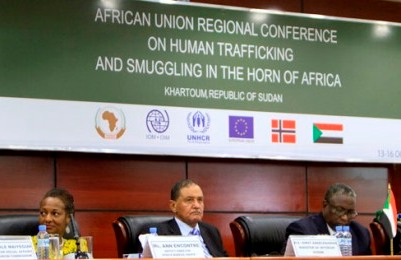Sudan to hold human trafficking conference
July 30, 2017 (KHARTOUM) – Sudan’s National Committee for Combating Human Trafficking (NCCHT) Sunday said arrangements are underway to hold a national conference to develop plans to address the human trafficking problem.

However, he said human trafficking cases that have been filed with the police have decreased from 83 cases in 2015 to 31cases in 2016.
Tirab also added that human trafficking cases among refugees have decreased to 11 cases since 2016, saying the government has exerted significant efforts to combat the phenomenon through ratifying a number of agreements and protocols.
The Sudanese official pointed out that a number of human traffickers have been tried according to the human trafficking law, saying some victims have been transferred to their home countries while others were granted asylum in Sudan.
For his part, the deputy director of the borders and foreigners department at the foreign ministry Ga’afar Mohamed Adam said combating human trafficking is considered a religious and ethical duty, pointing to the lack of resources which hinder efforts to carry out the task.
He disclosed that Sudan has been chosen as headquarters country for the regional centre for combating human trafficking, criticizing the recent U.S. report on human trafficking.
In its 2017 Trafficking in Persons report released earlier this month, the U.S. Department of State retained Sudan on Tier 3, saying the Sudanese government “does not fully meet the minimum standards for the elimination of trafficking and is not making significant efforts to do so”.
In January 2014, the Sudanese parliament approved an anti-human trafficking law which punishes those involved with human trafficking with up to 20 years imprisonment.
Also, in 2014, Khartoum hosted a conference on human trafficking in the Horn of Africa, organised by the African Union (AU), the UN High Commissioner for Refugees (UNHCR), the International Organization for Migration (IOM) and the Sudanese government.
The East African nation has also forged a strategic partnership with several European countries and the EU to combat illegal migration and human trafficking.
(ST)
